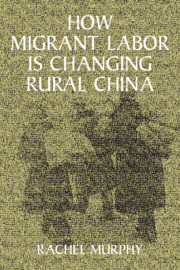Book contents
- Frontmatter
- Contents
- List of Exhibits
- Acknowledgments
- Glossary
- Poem: “I Work in the City”
- Map People's Republic of China
- Map Jiangxi Province
- Introduction
- 1 Values, Goals, and Resources
- 2 China, Jiangxi, and the Fieldwork Counties
- 3 Resource Redistribution and Inequality
- 4 Migration, Remittances, and Goals
- 5 Recruiting Returnees to Build Enterprises and Towns
- 6 The Enterprises and the Entrepreneurs
- 7 Entrepreneurs, Socioeconomic Change, and Interactions with the State
- 8 Returning Home with Heavy Hearts and Empty Pockets
- 9 Conclusion
- Notes
- Bibliography
- Index
Introduction
Published online by Cambridge University Press: 09 November 2009
- Frontmatter
- Contents
- List of Exhibits
- Acknowledgments
- Glossary
- Poem: “I Work in the City”
- Map People's Republic of China
- Map Jiangxi Province
- Introduction
- 1 Values, Goals, and Resources
- 2 China, Jiangxi, and the Fieldwork Counties
- 3 Resource Redistribution and Inequality
- 4 Migration, Remittances, and Goals
- 5 Recruiting Returnees to Build Enterprises and Towns
- 6 The Enterprises and the Entrepreneurs
- 7 Entrepreneurs, Socioeconomic Change, and Interactions with the State
- 8 Returning Home with Heavy Hearts and Empty Pockets
- 9 Conclusion
- Notes
- Bibliography
- Index
Summary
SINCE the early 1980s, over 100 million Chinese farmers have left their native villages to work as itinerant laborers and traders in the cities. They form the largest peacetime movement of people in history. To the consternation of the state, there are even more potential migrants; officials estimate that an additional 130 million rural people lack sufficient land or employment to guarantee their livelihoods. The majority of migrants are from poor rural areas of the interior provinces, which are predominantly agricultural and have low levels of economic diversification. These migrants are highly visible in the cities: at railway and bus stations, on construction sites, in markets, on street corners, and in queues at postal money transfer counters. A rich body of literature discusses the situation of the migrants in the cities. However, far less is known about the impact of out-migration, remittances, and return on those living in the countryside.
The impact of rural–urban labor migration on the Chinese countryside is dramatic not only because of the vast numbers of people who are affected, both directly and indirectly, but also because it is a relatively new phenomenon. Owing to economic planning and restrictions on mobility during the Maoist era (1955–1978), Chinese villages were isolated for more than twenty years. Since then there have been fundamental changes, including the rise of labor and commodity markets.
- Type
- Chapter
- Information
- How Migrant Labor is Changing Rural China , pp. 1 - 9Publisher: Cambridge University PressPrint publication year: 2002



